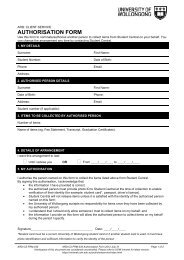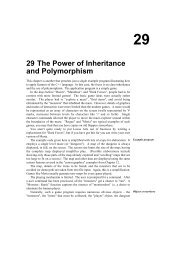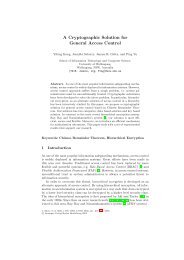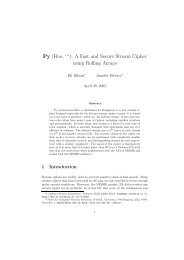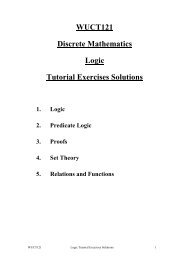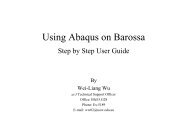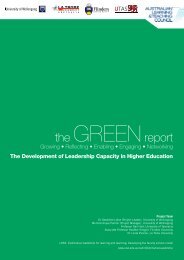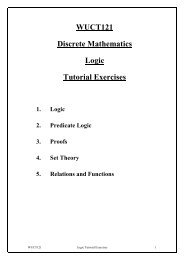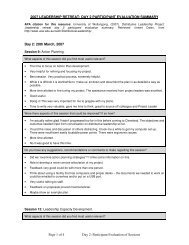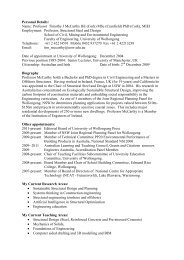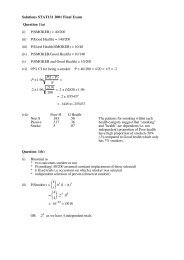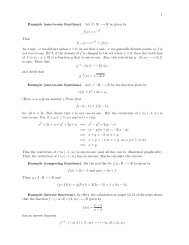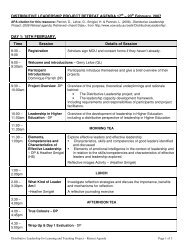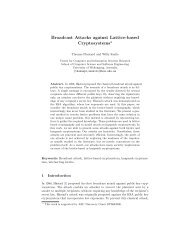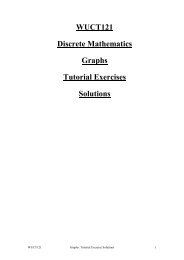india author m 1- a-nan - University of Wollongong
india author m 1- a-nan - University of Wollongong
india author m 1- a-nan - University of Wollongong
Create successful ePaper yourself
Turn your PDF publications into a flip-book with our unique Google optimized e-Paper software.
y discussion <strong>of</strong> links between All About H. Hatterr (1948) and Forster, philsophy and the<br />
Absurd, Dostoevsky’s Notes from the Underground, Camus, Sartre and Beckett.<br />
Concentrates on ‘The Song to Ganga’ in Hatterr as crucial expression <strong>of</strong> visionary experience.<br />
Desani's minor works are dealt with in the chapters "Kipling's Mother and Hali's Women" and<br />
"Goan, meet a Samoan". Determines the writing to be entirely self-reflexive. Comprehensive<br />
bibliography.<br />
RIEMENSCHNEIDER, DIETER. "All About H. Hatterr and the Problem <strong>of</strong> Cultural<br />
Alienation" The Literary Criterion 20.2 (1985):23-35. The problem <strong>of</strong> alienation is intensified<br />
by the numerous expressions <strong>of</strong> a lack <strong>of</strong> communication in the text. Perceives the structure <strong>of</strong><br />
the book coheres in translating “the message <strong>of</strong> the practical East” into a comprehensible<br />
statement. Claims an existential analysis answers the central quandary <strong>of</strong> the narrator’s quest.<br />
SHARRAD, PAUL. "Musings on the Hats <strong>of</strong> Hatterr" ACLALS Bulletin 7th Series No. 4<br />
(1986):79-87.<br />
Suggests two contexts for reading Desani’s masterpiece: literature <strong>of</strong> Anglo-India,<br />
meaning both colonial and racially mixed; and literary “Indianness”, grounded in classical<br />
Sanskrit literature. Compares All about H. Hatterr (1948) to Rudyard Kipling’s Kim (1901)<br />
and to Dandin’s Dasakumaracarita as an originary Sanskrit source. Desani simultaneously<br />
confirms and undermines the <strong>author</strong>ity <strong>of</strong> both Christian and Hindu dogma.<br />
SRINATH, C.N. "G.V. Desani: All about H. Hatterr" Literary Criterion 9.3 (1970): 40-56.<br />
Reissued in The Literary Landscape Delhi: Mittal Publications, 1986: 12-30.<br />
Character study identifying the distinctive message <strong>of</strong> Hatterr in the description <strong>of</strong> a<br />
metaphysical attitude to life as leela or play. Hatterr shows both zest for life and passive<br />
acceptance <strong>of</strong> its contrasts. Makes comparison to Raja Rao’s The Cat and Shakespeare and<br />
notes the importance <strong>of</strong> the ‘hymn’ to Ganga section. Reveals the <strong>author</strong>’s fusing <strong>of</strong> technique<br />
and tone to express Hatterr’s attitude to life: a blend <strong>of</strong> the humourous, the grotesque and the<br />
serious.<br />
Deshpande, Gauri<br />
VERMA, MONIKA. "Gauri Deshpande" in DWIVEDI, A.N. "Eves' Song: Contemporary<br />
English Verse by Indian Women" Studies in Contemporary Indo-English Verse: A Collection<br />
<strong>of</strong> Critical Essays. Vol. I Female Poets Bareilly: Prakash Book Depot, 1985: 65-75.<br />
VARMA, MONIKA. “Gauri Deshpande” Commonwealth Quarterly 9.28 (1984): 15-28.<br />
Between Births works in two styles: delicate lyricism and assertive sincerity. Praises restraint<br />
and attention to Indian reality, noting lapses into poeticising, dramatic excess, careless<br />
punctuation and “feminine mushiness”. Evaluative critique favouring tight craft, “poetic<br />
seriousness”, correspondence to reality, and repression <strong>of</strong> physical detail: generally wanting <strong>of</strong><br />
women poets less <strong>of</strong> “sights and thighs”.<br />
Deshpande, Shashi<br />
KING, ADELE. "Shashi Deshpande: Portraits <strong>of</strong> an Indian Woman" in KIRPAL, VINEY,<br />
ed. & introd. The New Indian Novel in English: A Study <strong>of</strong> the 80s New Delhi: Allied<br />
Publishers, 1990: 159-67.<br />
DeSouza, Eunice<br />
JUSSAWALLA, ADIL. “One Woman’s Poetry” JSAL 18.1 (1983):88-90.



